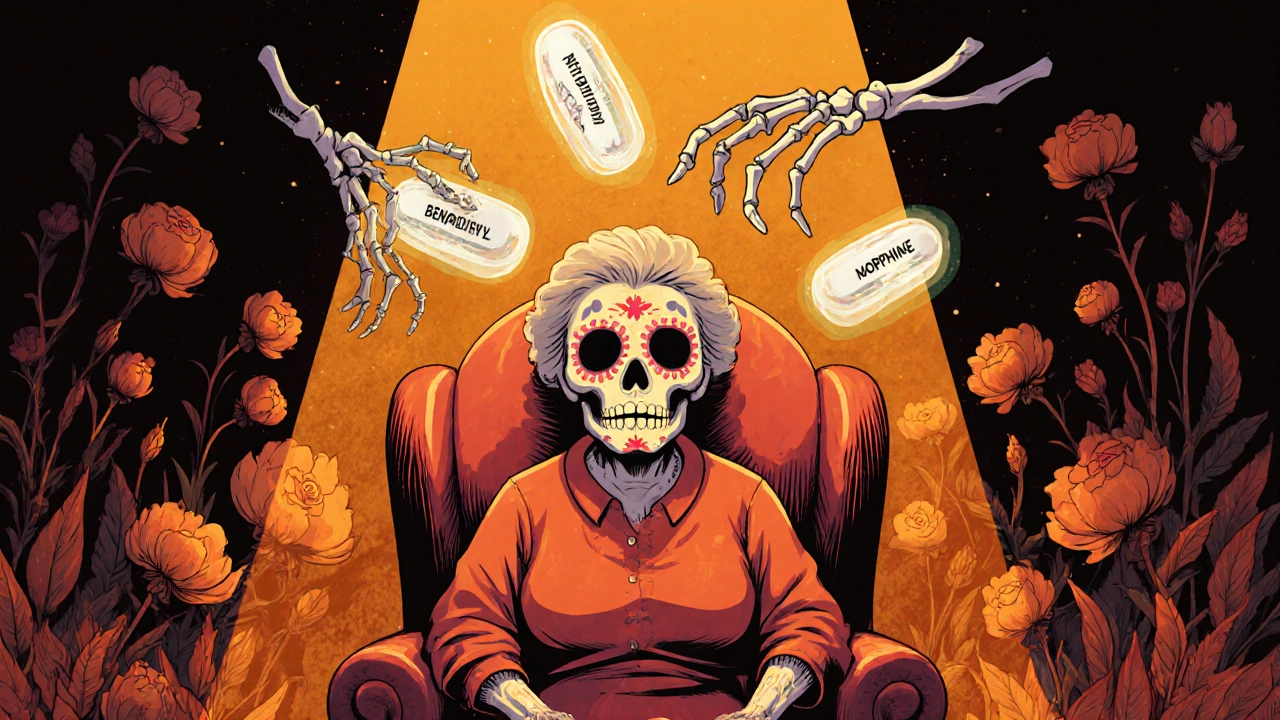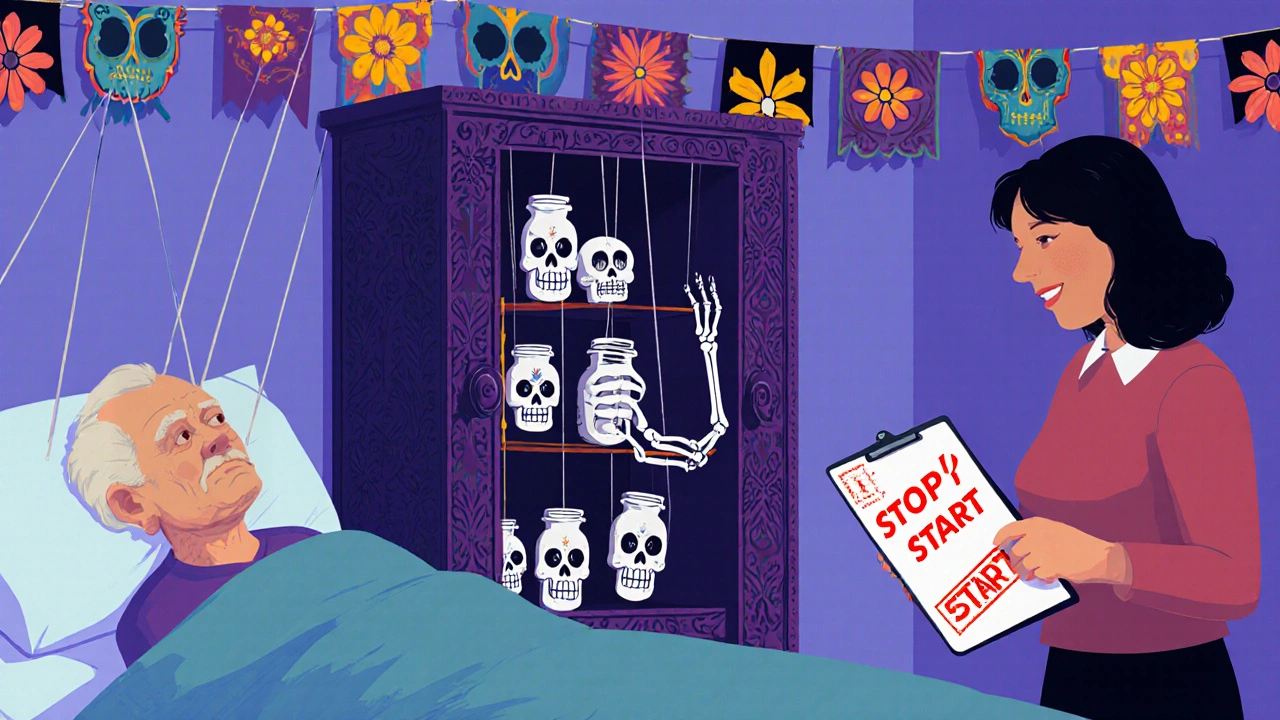Medication-Induced Delirium in Older Adults: Signs, Risks, and How to Prevent It
 Nov, 12 2025
Nov, 12 2025
What Is Medication-Induced Delirium?
Medication-induced delirium isn’t just confusion or forgetfulness. It’s a sudden, sharp change in mental state-like someone you know turns into a stranger overnight. One day, your parent is chatting about their garden; the next, they’re staring at the wall, mumbling, or acting aggressively for no reason. This isn’t dementia getting worse. It’s medication-induced delirium, and it’s one of the most common, preventable, and dangerous side effects of drugs given to older adults.
Unlike dementia, which creeps in slowly over years, delirium hits fast-sometimes within hours. It comes and goes during the day. A person might seem fine in the morning, then be lost and agitated by afternoon. They forget where they are, can’t follow a conversation, or don’t recognize family members. This isn’t normal aging. It’s a medical emergency.
Why Older Adults Are at Higher Risk
As we age, our bodies change. The liver and kidneys don’t process drugs as quickly. Brain chemistry becomes more sensitive. Even small doses of certain medications can overload the system. Older adults often take multiple pills for different conditions-high blood pressure, arthritis, sleep problems, bladder issues. That’s called polypharmacy. And the more meds someone takes, the higher the risk.
People over 85 are more than twice as likely to develop delirium than those in their mid-60s. Those with existing memory problems, like dementia, are at even greater risk. When a medication triggers delirium in someone already struggling with cognition, symptoms last longer-on average 8 days instead of 5-and recovery is harder.
Top Medications That Cause Delirium
Not all drugs are equal. Some are far more dangerous for older adults. The biggest culprits fall into three main groups:
- Anticholinergics-These block acetylcholine, a brain chemical critical for memory and attention. Common ones include diphenhydramine (Benadryl), oxybutynin (for overactive bladder), and amitriptyline (for pain or depression). Every extra anticholinergic drug raises delirium risk. Three or more can make delirium nearly five times more likely.
- Benzodiazepines-Drugs like lorazepam (Ativan) and diazepam (Valium) are often given for anxiety or sleep. But they slow down brain activity too much. Studies show these drugs triple the odds of delirium in hospitals. Even short-term use can trigger it.
- Opioids-Morphine and codeine can cause confusion, especially at higher doses. Meperidine (Demerol) is especially risky because of a toxic byproduct that builds up in older bodies. Hydromorphone is a safer alternative-27% less likely to cause delirium at the same pain-relieving dose.
The American Geriatrics Society’s Beers Criteria® lists 56 medications to avoid in seniors because of delirium risk. Many are still routinely prescribed. A 2023 study found that 43% of hospitals still give high-risk drugs like Benadryl for sleep or allergies-despite better, safer options like loratadine (Claritin).

How Delirium Shows Up-It’s Not Always Obvious
There are three types of delirium, and only one is easy to spot:
- Hyperactive-Restless, agitated, yelling, hallucinating. This one gets attention.
- Mixed-Switches between hyperactive and quiet.
- Hypoactive-The silent killer. The person is withdrawn, sleepy, unresponsive, or seems depressed. They sit quietly, don’t eat, don’t talk. This is the most common type-72% of cases-but it’s mistaken for fatigue, depression, or just "getting old."
Family members often report a "complete transformation" within 48 hours of starting a new drug. A once-alert, chatty parent becomes silent and distant. A caregiver might think, "They’re just tired," or "This is normal for someone their age." But it’s not. And it’s reversible-if caught early.
How to Prevent It
Prevention isn’t complicated. It’s about being smart with meds.
- Review every medication-Ask the doctor or pharmacist: "Which of these could cause confusion?" Use the Anticholinergic Cognitive Burden (ACB) scale. A score of 3 or higher means high risk. Many seniors are on meds with a score of 4 or 5-without knowing it.
- Replace high-risk drugs-Swap Benadryl for Claritin. Swap diazepam for non-benzodiazepine sleep aids like trazodone (if appropriate). Swap morphine for hydromorphone in pain management.
- Use the STOPP/START criteria-This is a tool doctors use to cut out inappropriate meds and add necessary ones. Hospitals using it see a 26% drop in delirium cases.
- Manage pain without opioids-Use acetaminophen, ice packs, physical therapy, and distraction techniques. Studies show this cuts opioid use by 37%, which lowers delirium risk.
- Don’t stop meds cold turkey-If a benzodiazepine needs to be stopped, taper slowly over 7-14 days. Stopping suddenly can cause withdrawal delirium, which is just as dangerous.
Hospitals with the Hospital Elder Life Program (HELP) reduce delirium by 40%. Their secret? No sedatives unless absolutely needed. Regular reorientation. Walking every few hours. Keeping glasses and hearing aids in place. Family visits. Simple things-done consistently.
What to Do If You Suspect Delirium
If someone you care for suddenly seems confused, withdrawn, or agitated:
- Check their medication list-did anything change in the last 3 days?
- Look for signs of infection-fever, urinary urgency, redness, or swelling. Infection is another major trigger.
- Call the doctor immediately. Don’t wait. Say: "I think this might be delirium. Could it be a medication reaction?"
- Bring a full list of all medications, including supplements and OTC drugs.
Don’t assume it’s "just dementia." Delirium can happen on top of dementia-and it makes everything worse. The sooner you act, the faster they recover.
The Bigger Picture: Why This Matters
Delirium isn’t just a medical glitch. It’s costly. It’s dangerous. It’s life-changing.
- Patients with delirium stay in the hospital 8 days longer on average.
- They’re twice as likely to die within a year.
- Many never fully recover mentally or physically.
- In the U.S., it costs $164 billion a year in extra care.
And here’s the worst part: 70% of cases go undiagnosed because staff aren’t trained to spot hypoactive delirium. Only 35% of hospital workers can correctly identify it.
Since 2018, Medicare has labeled hospital-acquired delirium a "never event." That means hospitals don’t get paid for treating complications from it. That’s pushing change-but slowly.
Now, the FDA requires stronger warning labels on anticholinergic drugs. The National Institute on Aging is funding real-time EHR tools that flag high-risk prescriptions. AI systems are being tested to predict delirium risk before it happens.
But until families and caregivers know the signs and speak up, nothing changes.
Final Thoughts: Your Power as a Caregiver
You don’t need to be a doctor to save someone from delirium. You just need to be observant and persistent.
- Know the meds. Write them down. Ask questions.
- Watch for sudden changes-not gradual ones.
- Speak up, even if you’re told, "It’s just aging." It’s not.
- Push for alternatives. There’s almost always a safer option.
Medication-induced delirium is preventable. It’s reversible. But only if someone notices it in time. You might be the only one who does.
Can over-the-counter drugs like Benadryl cause delirium in seniors?
Yes. Diphenhydramine (Benadryl) is a strong anticholinergic drug. Even one dose can trigger confusion, drowsiness, or hallucinations in older adults. It’s commonly used for allergies or sleep, but safer alternatives like loratadine (Claritin) or cetirizine (Zyrtec) exist. The American Geriatrics Society lists Benadryl as a medication to avoid in seniors.
Is delirium the same as dementia?
No. Dementia is a slow, progressive decline in memory and thinking that lasts months or years. Delirium is sudden-developing over hours or days-and often fluctuates. Someone with dementia can still have delirium on top of it, which makes symptoms worse and recovery harder. Delirium is reversible; dementia is not.
How long does medication-induced delirium last?
It depends. If the triggering drug is stopped and no other problems exist (like infection), symptoms often clear up in days to a week. But in seniors with dementia or other health issues, delirium can last 2-8 weeks. Some never fully return to their previous mental state.
Can anxiety or sleep meds cause delirium?
Yes. Benzodiazepines like lorazepam and diazepam are major triggers. Even non-benzodiazepine sleep aids like zolpidem (Ambien) can contribute. These drugs slow brain activity too much in older adults. The American Geriatrics Society recommends using them only for short-term, acute situations like alcohol withdrawal or seizures-not for routine sleep problems.
What should I do if my parent is in the hospital and seems confused?
Ask the nurse or doctor: "Could this be delirium? Is there a new medication that might be causing it?" Bring a full list of all medications, including supplements. Request a medication review. Push for non-drug approaches to sleep and anxiety. If they’re not being screened for delirium, ask why. Hospitals using the Confusion Assessment Method (CAM) screen for it daily-ask if they do.
Are there tools to check if a medication is risky for seniors?
Yes. The Beers Criteria® from the American Geriatrics Society lists medications to avoid in seniors. The Anticholinergic Cognitive Burden (ACB) scale rates drugs by delirium risk. You can find free online calculators that let you plug in a list of meds and get a risk score. Pharmacists can also run these checks for you.
Next Steps: What to Do Today
If you’re caring for an older adult:
- Get a complete list of all medications-prescription, OTC, supplements.
- Check each one against the Beers Criteria® or use an ACB calculator.
- Call the doctor or pharmacist. Ask: "Which of these could cause confusion?"
- Ask if safer alternatives exist.
- Start watching for sudden changes in behavior or alertness.
You don’t need to fix everything overnight. But one conversation-about one pill-could prevent a hospital stay, a fall, or even death. That’s the power of knowing the signs.
David Barry
November 13, 2025 AT 00:28Alex Ramos
November 14, 2025 AT 18:00edgar popa
November 15, 2025 AT 18:09Eve Miller
November 17, 2025 AT 05:02Ryan Everhart
November 17, 2025 AT 12:24Mark Rutkowski
November 19, 2025 AT 00:52Amie Wilde
November 19, 2025 AT 03:55Gary Hattis
November 20, 2025 AT 12:56Benjamin Stöffler
November 21, 2025 AT 10:05Esperanza Decor
November 22, 2025 AT 15:57Chrisna Bronkhorst
November 23, 2025 AT 06:23Erica Cruz
November 23, 2025 AT 08:32Deepa Lakshminarasimhan
November 24, 2025 AT 10:22Alyssa Lopez
November 25, 2025 AT 21:21